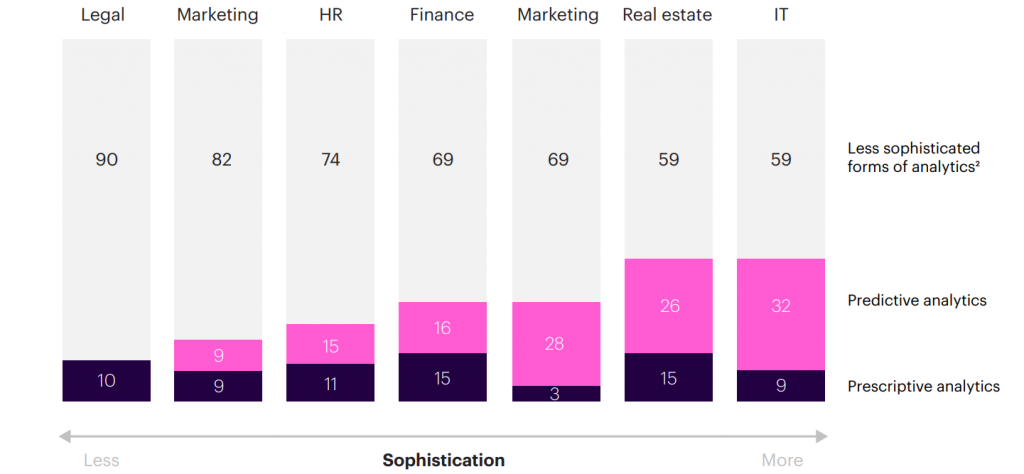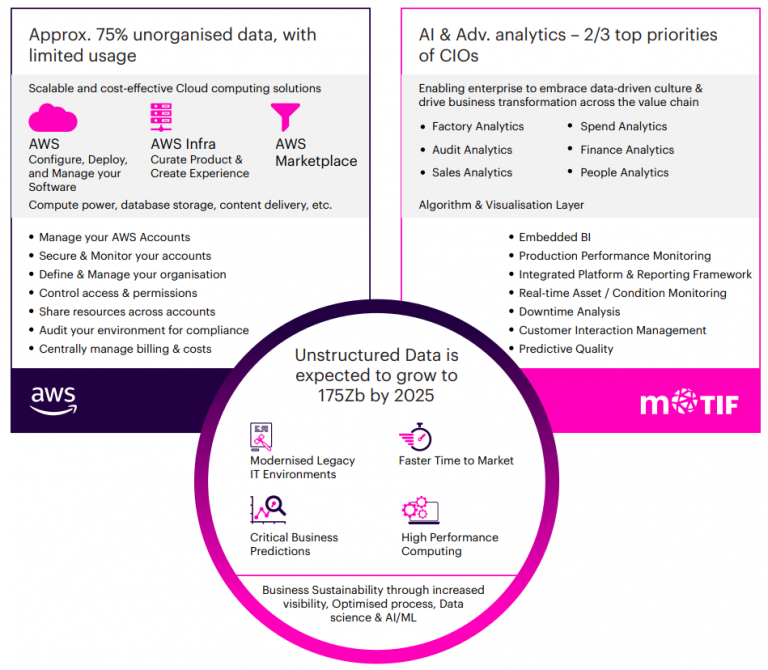The Roadmap to Digital Transformation
Leveraging Emerging Technologies for Success
The first phase of IT-enabled business transformation automated individual business activities through software applications leading to increased productivity and efficiency. The transformation also made it feasible for enterprises to capture new data, leading to the standardisation of processes. In the 1990s, the internet made access to information easier and unleashed the second wave of IT-enabled business transformation. Internet applications became integrated into the business value chain creating new sources of revenue and competitive advantage.
Digital transformation is a series of evolutionary steps and long-term efforts to continuously improve and evolve an organisation by applying emerging technologies. It enables enterprises to leverage advanced technologies such as cloud computing, artificial intelligence (AI), Internet of Things (IoT) through cross-functional efforts to drive operational efficiencies, decision-making, and customer experiences.
The Role of Cloud Computing in Improving Productivity and Developing New Capabilities
Historically, only one-third of business transformations have succeeded. At the same time, the success percentage is even lower for digital transformation at 14%, and it varies for digital-savvy industries such as media, telecommunications, and traditional sectors such as oil and gas, pharmaceuticals and others. One of the limiting factors has been outdated technology infrastructure that couldn’t cope with the processing capabilities required for sophisticated data analytics.
Cloud computing enables enterprises to eliminate these disadvantages, and its values extend beyond the technology benefits it offers. Cloud computing enhances development productivity through new working methods such as agile and DevOps and improves efficiency through API-based or self-service-based workflows and automation. The cloud frees the developer from infrastructure management and production support activities, enabling them to focus on application design and development. It has improved application development productivity by 38% and infrastructure cost efficiency by 29% for applications migrated to the cloud. The cloud-enabled application development efficiency helps companies bring new capabilities to market about 20 to 40 percent faster.
Cloud-enabled initiatives can improve different aspects of enterprises such as products, services, or processes. The unlimited processing capacities enable businesses to run complex advanced analytics which helps improve processes efficiency and understanding of customer needs. Cloud platform’s scalability, security, and cost advantages set the foundation for enterprises to effectively leverage the potential of other advanced technologies such as AI and analytics, and Internet-of-Things.
Lean practice’s drove the initial phase of operational efficiency. Now, advanced analytics, AI, and connected devices are helping enterprises improve their operation’s productivity, flexibility, and sustainability.
The internet has led to exponential growth in data volume, which will continue to rise as more users and devices get connected. The number of IoT devices will increase to an estimated 29 billion showing growth of 200% in a decade. The enterprises that derive value from data will have significant competitive advantages and capitalise on new business opportunities and growth potential.
Connected processes and digitised business value chains give teams access to quality data sets, and advanced analytical models allow them to extract deeper insights concealed among thousands of data points. However, the organisation needs to follow a methodological approach to identify the parts of the business value chain that can potentially derive analytics advantage. It can vary across the industry, with manufacturing companies deriving maximum value from applying advanced analytics to the supply chain. In contrast, service companies such as insurance can benefit from using advanced analytics in risk models and customer experiences. The enterprises are also increasing investments in advanced analytic applications in general and administrative (G&A) functions such as human resources (HR). The usage of analytics is expected to increase by 21 per cent to 80 per cent across different functions respectively.
Level of sophistication of advanced analytics currently being deployed within corporate function1, % of respondents (n=302)

![]() Respondents were asked to rate the sophistication of analytics they were able to deploy in their function on a scale of 1 (least mature) to 5 (most mature),
Respondents were asked to rate the sophistication of analytics they were able to deploy in their function on a scale of 1 (least mature) to 5 (most mature),
where level 1 = basic reporting of data only; 2 = reporting with the ability to drill down into data; 3 = trend analytics; 4 = predictive analytics to inform
decision making; and 5 = more advanced prescriptive analytics
![]() Including basic reporting, reporting with drill-down capability, trend analyses, etc.
Including basic reporting, reporting with drill-down capability, trend analyses, etc.
Source: McKinsey Corporate & Business Functions Survey of 302 senior executives globally across industries, May 2022
AI and Machine Learning (ML) adoption will redefine industries, economies, and our everyday lives. The recent advancements in generative AI with the release of ChatGPT are turning out to be aninflexion point for enterprise AI adoption. AI helps businesses automate tasks and free resources for more value-added work. It analyses vast data volumes to identify trends, predict the future, and help enterprises to make informed decisions with precision. AI adoption is highest in marketing, sales, operations, and product or service development. AI and ML help enterprises personalise customer interaction leading to enhanced experience and loyalty. AI-powered applications will contribute $11 trillion to $17.7 trillion of economic value, with generative AI contributing an additional 15% to 40%.
As advanced technologies enable data collection across the value chain, companies can take a holistic approach to optimising processes. Advanced technologies are helping heavy industries take a proactive approach to improving their production systems. Heavy industry processes encounter high variability due to variations in input material quality, demand, and process conditions. Advanced analytics technologies enable companies to use upstream data and adjust process models in time to prevent the cascading impact of variability across the value chain leading to improved operational efficiency. It also enhances product quality, which translates into improved customer satisfaction and experience.
AWS is a platform that includes multiple services such as computing, storage, networking, databases, analytics, AI/ML, security, IoT, management and monitoring, serverless computing, and other services that Amazon adds periodically to meet the evolving needs of businesses across different industries and use cases. AWS can help your business with digital transformation in several ways, as listed below
![]() Data Analytics and AI/ML
Data Analytics and AI/ML
AWS offers data analytics and AI/ML (Artificial Intelligence/Machine Learning) services, such as Amazon Redshift for data warehousing, Amazon Athena for interactive querying, and Amazon SageMaker for building and deploying machine learning models.
![]() Cost optimisation
Cost optimisation
AWS’s pay-as-you-go pricing model will enable you to reduce upfront infrastructure costs and pay only for the computing resources that your enterprise consumes.
![]() Scalable Infrastructure
Scalable Infrastructure
AWS’s scalable and flexible cloud infrastructure ensures your businesses can handle increased workloads during peak demand and optimise resource usage during lean periods.
![]() Agility
Agility
AWS provides tools and services like AWS Lambda for serverless computing and AWS CodePipeline for continuous integration and delivery (CI/CD). It enables your developers to accelerate the application development cycles and launch new digital products and services faster.
![]() Security and Compliances
Security and Compliances
AWS also offers compliance programs, including HIPAA, GDPR, and PCI DSS, that enable you to achieve and maintain compliance with regulatory requirements.
![]() Provider Ecosystem
Provider Ecosystem
AWS has an ecosystem of solutions providers that offer specialised services and solutions customised to different industries and use cases. The solution providers and partners provide consulting and implementation support to enterprises to help them with digital transformation.
Motherson and AWS first started collaborating to help enterprises drive digital transformation by leveraging cloud and other advanced technologies. Our collaboration
enables you to leverage scalable infrastructure, robust security measures, and a wide range of services such as advanced analytics, AI, IoT, and automation to streamline operations, optimise processes, and drive growth.
By combining our technical and business expertise with AWS evolving cloud innovations, we have delivered solutions and services to more than 200 clients across the globe. We are an AWS Partner Network (APN) member, validated by Amazon Web Services for our technical proficiency and proven customer success.
MOTIF is our proprietary 360-degree data platform that provides actionable insights in near real-time for key business applications across the business value chain. The big data and analytics-based solution suite enable enterprises to leverage the power of advanced analytics across operations, finance, procurement, sales, and audit functions to holistically improve business performance.
MOTIF Analytics Suite
With a dedicated analytics team we work together with the clients to build capabilities for sustainable future. Our solutions range from use-case-specific applications to full-scale analytics transformations.

Finance Analytics
Effective & efficient planning, budgeting and management reporting with the help of data & analytics
Industry: All

Spend Analytics
Leveraging analytics for Optimising the Procurement
Cycle, Efficient Supplier Management & Strategic Global Sourcing
Industry: All

Sales Analytics
Unlocking the power of Advanced Analytics to
improve the Return on Sales by analysing the Trends & Patterns in Sales
Industry: All

Audit Analytics
Data driven evaluation against audit rules and criteria to Generate, Manage, Notify & Track audit exceptions through workflow
Industry: All

Factory Analytics Solution
Operational Improvements and enhanced Plant Productivity using the power of Data and Advanced Analytics
Industry: Manufacturing

People Analytics
Supports Strategic Decision Making for accurate Workforce Planning, Attrition Analysis and effective Training & Development
Industry: All
Technology Use
Collaborative Platform for Data Driven Customer Experience…

Working with AWS, we helped an electrical equipment manufacturing company switch from a traditional manufacturing set-up to a fully connected, flexible, and digitised shop floor ecosystem. The massive volume of data generated from various machines was tracked manually, leading to inconsistent data. It led to wrong data entry into the enterprise resource planning system, leading and material wastage. We helped the company address the issue by building the data integration, transformation, data warehouse (DWH) and insight layer to facilitate data-driven decision-making on the shop floor. We integrated HPE, iDACS, and MOTIF analytical suites with different data sources to have clear visibility on the shop floor. The analytical solution provided a clear view of all functions through a centralised monitoring dashboard. It gives the plant manager a correct stock view and lets them plan the production and machine maintenance schedule, limiting downtime and improving operation efficiency.
Our Digital and Analytic Services help enterprises accelerate digital transformation by building their data-driven capabilities. In close coordination with our consulting
practice Synergia, we help create a digital transformation strategy and roadmap for the enterprise to enable them to realise value from their data and develop a data culture within the organisation. Our services will enable you to improve operational efficiencies, productivity, and lower operational costs through advanced analytical solutions. We will help you leverage customer insights for a design-led, customer-centric transformative approach to create exceptional customer experiences. You can use the data insights to identify new revenue opportunities and customer segments and develop appropriate digital products and services.